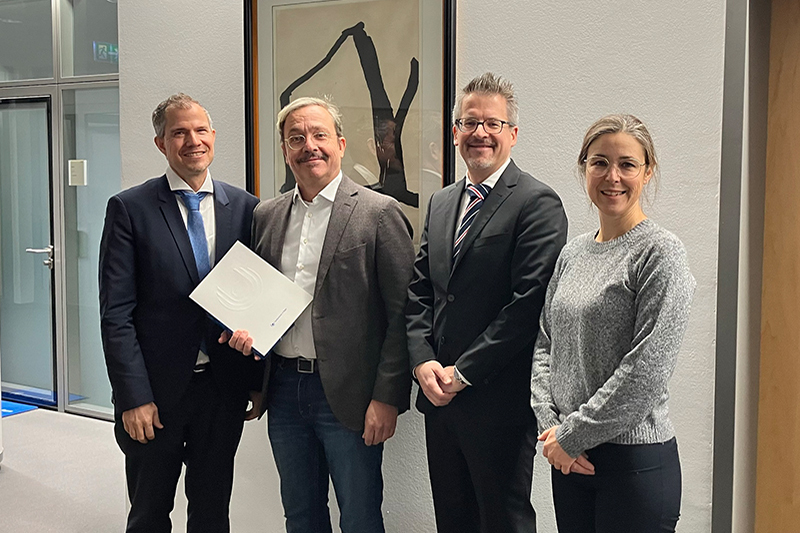Forschungsprofessur „Learning Sciences in Higher Education"
 Foto: CATALPA
Foto: CATALPA
Psychologie digitalen Lehrens und Lernens
Mit dem Design und der Entwicklung „Intelligenter Lerntechnologien” sind interdisziplinäre Herausforderungen aber auch grundlegende Erkenntnisse aus der Lern- und Instruktionspsychologie verbunden.
In der Forschungsprofessur, die sich rund um das Thema „Psychologie des digitalen Lehrens und Lernens“ dreht, wird Mensch-Computer-Interaktion in Lehr- und Lernprozessen auf drei Ebenen untersucht:
- A) Wissenakquise,
- B) Regulation,
- C) sowie Lernmotivation.
Diese Ebenen stehen als wesentliche Variablen erfolgreichen Lernens im Vordergrund um Lerntechnologien, Lernaktivitäten, Lehrdesigns und deren Effekte zu untersuchen.
-
- Nutzung von Learning Analytics und der Effekte auf metakognitive Prozesse, Lernresultate und Lernmotivation
- Nutzung von Augmented und Virtual Reality für die Entwicklung authentischer Problemlösekompetenz, gezielter Übung und Entwicklung übergreifender Kompetenzen
- Nutzung von künstlicher Intelligenz und deren Einfluss auf Selbstwirksamkeit, Lernerfolg und Lernmotivation
-
Prof. Dr. Marcus Specht
 Foto: Privat
Foto: PrivatMaria Efstathiadou
Assistenz der Forschungsprofessur
E-Mail: maria.efstathiadou
Telefon: +49 2331 987-4678
PRG, Raum B 113 (1. Etage)
Dr. Florence Kristin Lehnert
 Foto: Privat
Foto: PrivatDaiana Rinja
 Foto: Privat
Foto: Privat -
2025
Zeitschriftenartikel
- Lehnert, F., Doublet, S., & Sim, G. (2025). Designing usability/user experience heuristics to evaluate e-assessments administered to children. Computer Standards & Interfaces, 92, 103933. https://doi.org/10.1016/j.csi.2024.103933
- van Martins Jaarsveld, G., Wong, J., Baars, M., Specht, M., & Paas, F. (2025). Goal setting in higher education: how, why, and when are students prompted to set goals? A systematic review. Frontiers in Education, 9, Article 1511605. https://doi.org/10.3389/feduc.2024.1511605
2024
Zeitschriftenartikel
- Soleymani, A., Aerts, T., Laat, M. de, & Specht, M. (2024). Gamified Networked Learning Environments in Higher Education: A Study on Student Engagement and Value Creation in Computer Science. European Conference on Games Based Learning, 18(1), 755–765. https://doi.org/10.34190/ecgbl.18.1.2660
- Zhang, X., Aivaloglou, F., & Specht, M. (2024). A Systematic Umbrella Review on Computational Thinking Assessment in Higher Education. European Journal of STEM Education, 9(1), 2. https://doi.org/10.20897/ejsteme/14175
Konferenzbeiträge
-
de Wit, S., Hermans, F., Specht, M., & Aivaloglou, E. (2024). Gender Differences in Story, Game and Visual Adventures in Hedy. In F. Hermans & R. Bohrer (Eds.), Proceedings of the 2024 ACM SIGPLAN International Symposium on SPLASH-E (pp. 1–11). ACM. https://doi.org/10.1145/3689493.3689983
de Wit, S., Hermans, F., Specht, M., & Aivaloglou, E. (2024). Gender, Social Interactions and Interests of Characters Illustrated in Scratch and Python Programming Books for Children. In B. Stephenson, J. A. Stone, L. Battestilli, S. A. Rebelsky, & L. Shoop (Eds.), Proceedings of the 55th ACM Technical Symposium on Computer Science Education V. 1 (pp. 262–268). ACM. https://doi.org/10.1145/3626252.3630862
- Valle Torre, M., Oertel, C., & Specht, M. (2024). The Sequence Matters in Learning - A Systematic Literature Review. In Proceedings of the 14th Learning Analytics and Knowledge Conference (pp. 263–272). ACM. https://doi.org/10.1145/3636555.3636880
- van der Werf, V., Hermans, F., Specht, M., & Aivaloglou, E. (2024). Variables and Variable Naming in Popular Programming Textbooks for Children and Novices. In M. Dorodchi, M. Zhange, & S. Cooper (Eds.), Proceedings of the 2024 on ACM Virtual Global Computing Education Conference V. 1 (pp. 242–248). ACM. https://doi.org/10.1145/3649165.3690112
- van der Werf, V., Swidan, A., Hermans, F., Specht, M., & Aivaloglou, E. (2024). Teachers' Beliefs and Practices on the Naming of Variables in Introductory Python Programming Courses. In A. Roychoudhury, A. Paiva, R. Abreu, M. Storey, K. Gama, & J. Siegmund (Eds.), Proceedings of the 46th International Conference on Software Engineering: Software Engineering Education and Training (pp. 368–379). ACM. https://doi.org/10.1145/3639474.3640069
- Zhang, X., Aivaloglou, E., & Specht, M. (2024). Teachers' Intention to Integrate Computational Thinking Skills in Higher Education: A Survey Study in the Netherlands. In 2024 IEEE Global Engineering Education Conference (EDUCON) (pp. 1–9). IEEE. https://doi.org/10.1109/EDUCON60312.2024.10578887
-
Maria Efsthatiadou
Assistenz der Forschungsprofessur Learning Sciences
E-Mail: maria.efstathiadou
Telefon: +49 2331 987-4678
PRG, Raum B 113 (1. Etage)


